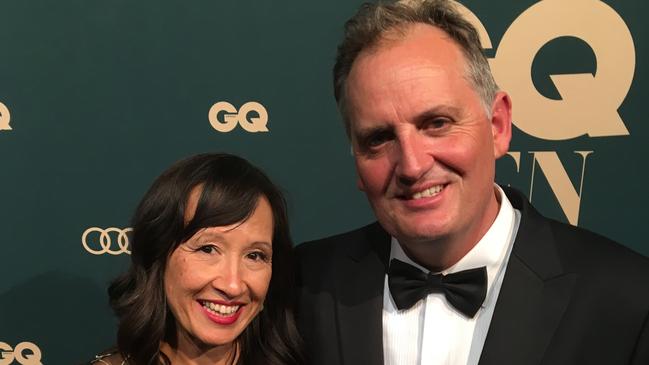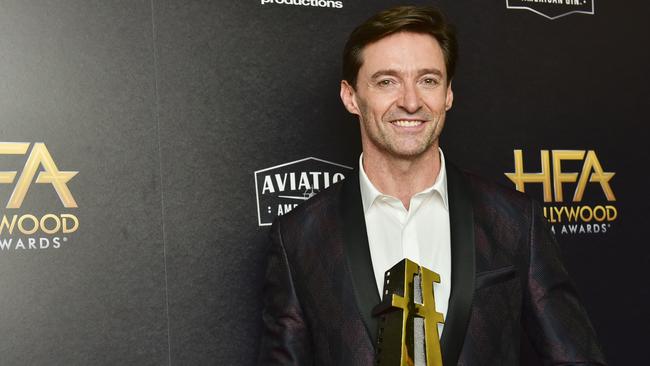Thomas reveals driving forces behind Teacher’s Pet podcast
Hedley Thomas reveals the forces behind the crime podcast and how it’s the subject of a Hollywood bidding war | LISTEN

The meeting between investigative reporter Hedley Thomas with his bosses Lachlan Murdoch and John Hartigan was expected. But the tears that suddenly flowed were not.
It was 2002, 16 years before Thomas created the globally successful podcast, The Teacher’s Pet. Someone (whose identity remains a mystery) had blasted four gun shots into the Brisbane home Thomas shared with wife Ruth, also a journalist, and two young children.
One blast shattered the bedroom window inches from the couple’s heads.
The house was quickly patched up, but other repairs took longer.
“There’s damage when something like that happens,” Thomas, looking emotional, tells the Behind the Media podcast, available online.
“The house is repaired, and the windows were replaced and so on. And the children quickly forget that they had to leave quickly with us and stay somewhere else and then go away for a few weeks to Tasmania and come back and all the bullet holes are gone. But there’s damage and we don’t forget.”
The damage, Thomas says, was personally far-reaching and he lost confidence as both a journalist and a father. Lachlan Murdoch, Rupert Murdoch’s son, then chairman of News Limited, News Corp’s Australian division, and Hartigan, then chief executive, had called Thomas in for a debrief and to discuss security.
“Lachlan and John were talking about what had happened and how they were very proud of the way Ruth and I had come through it unscathed and how we’d conducted ourselves. And again, I knew differently and I started crying in front of these two leaders of our business. I think they thought ‘Shit, Hedley needs help’. And they gave so much help.”
The Thomas family played an important part in the genesis of The Teacher’s Pet podcast crime investigation, which has been downloaded about 27 million times and is the subject of a bidding contest from Hollywood production companies, studios and networks.
Hugh Jackman has been a supportive, friendly adviser to Thomas throughout the process — with no strings attached — due to his strong belief in the exposing of universal themes at the heart of The Teacher’s Pet series, such as domestic violence, sexual abuse, guilt, alleged murder and police incompetence.

The opening scene of any eventual film (a deal is close but not yet signed) could be set at home. Thomas’ character would be in the roof above his carport with his son, Alexander, then 19, sifting through his “vault” searching for his old files on the disappearance and presumed murder of Lyn Dawson from Sydney’s northern beaches in 1982. It is an extremely hot day, and the pair are drenched in sweat.
Thomas, then 50, whose father has recently died, is doing some re-evaluating. “I wanted to do something really, really challenging and unorthodox for me after my father died last year,” he recalls. “My dad was a great mentor and he really motivated me, he was a really good fella.”
But the file is hard to find. Alexander keeps asking “What’s the big deal about this … story?”
It was that back and forth that provided an invaluable exercise in Thomas explaining why the story still mattered, 36 years after the events and 16 years after he had written about it.
Would we have the podcast if his dad, Hedley snr, hadn’t died?
“No, I don’t think so. I had to find a story that would consume me so much that I could get re-engaged,” he says. “I was in awe of what Dan Box and Eric George (colleagues on The Australian) had done with Bowraville.”
That award-winning podcast investigated the killings of three Aboriginal children on the NSW mid-north coast in the 1990s. And importantly, it had an impact on the justice system that more conventional retellings of the story had not. But in September the NSW court of appeal ruled out a landmark retrial in that case.
LISTEN: All 14 episodes of The Teacher’s Pet podcast series are available here.
The Teacher’s Pet tells the story of Lyn Dawson, 33, who disappeared from Sydney’s northern beaches in 1982, leaving behind her daughters aged two and four. Chris Dawson, her ex-football star husband moves the babysitter, Joanne Curtis, a teenage student at the school where he is PE teacher, into the house and they marry a year later. Two inquests determined Lyn was probably murdered by her husband, but no-one was ever prosecuted.
Slade Gibson, guitarist from Savage Garden, handled audio production, mixing and music backing. But as soon as the first episode launched, Thomas was inundated with calls and emails so the running order went out the window. And he couldn’t keep up with writing 15,000 words a week for each episode and listening to all the audio interviews.
The podcast broke conventional wisdom with the length of its run (14 episodes) and the length of each episode (the final episode ran for two hours).
Some thought the podcast overran: “I didn’t lose control, but I was worried that I couldn’t do justice to the scale of the story, the magnitude, the importance of it.”
Thomas also felt a deep obligation to Lyn’s family to ensure the story was told faithfully. He remains in close contact with the family, who are supportive of a tasteful screen adaptation.
Chris Dawson, who strongly maintains his innocence, refused to engage in the series. But Thomas presented a defence case with the help of a top criminal barrister in Episode 14.
Paul Whittaker, the former Editor-in-Chief of The Australian who is now chief executive of Sky News, commissioned the production. The pair have been close friends since they were junior reporters together on the Gold Coast Bulletin and have been brothers-in-law for two decades.
Thomas is a relentless prosecutor of his journalism, whether his targets be businessman Clive Palmer or former prime minister Julia Gillard. But spend an hour with him and it is clear the attack dog moniker is misplaced. He exudes warmth and maintains eye contact, even when the tables are turned and he is the interviewee.
Now Thomas is enjoying the fruits of his success. Last week he was inducted in the Media Hall of Fame at the Melbourne Press Club and awarded Journalist of the Year at the GQ awards.
The Hall of Fame citation refers to a long career, including being sent overseas in 1989 to the News Corp bureau in London, where he witnessed the collapse of the Berlin Wall and crossed the Hungarian/Romanian border on a train with Nicolas Rothwell and Peter Hitchens, brother of Christopher Hitchens, on Christmas Eve to cover the Romanian revolution. And in 2007 Thomas took on the Howard government and Australian Federal Police when Dr Mohamed Haneef was arrested and had his visa cancelled for his supposed links to his terrorist cousins in the UK.
“I don’t believe Australia is a racist country but I believe that for craven and political purposes Mohammed Haneef was singled out and a bogus case was built against him and I lay the blame for that at John Howard's government,” Thomas says.
Thomas went in hard, angering authorities and at one point he feared a warrant would be issued to stop the paper printing.
Again, his father was on hand to provide advice. “I remember my dad saying ‘pal, you’ve really gone out a long way on this limb. I hope you’re right because if you’re not it’s going to be very bad for you and it could be the finish of your career. It gave me an opportunity in my own mind to again intellectually cycle back over all of the reporting I’d done.”
Dr Haneef was freed, received a confidential settlement and returned to India. Thomas was awarded the Gold Walkley, Australia’s highest accolade.
And then in 2008, he quit journalism for a corporate job in the coal seam gas sector. Everyone wanted to know why.
His answer is surprising and revealing. “I think I was maybe a little intimidated at what had been achieved,” he said, and then spoke of being copy boy at 17 and on the lowest rung of the journalistic ladder. “I was so grateful to have this opportunity and the idea of winning Walkley awards, let alone the Gold Walkley was just absurd to me.”
Two years later Thomas was back in journalism. He denies the job is an obsession. “I see myself being at times really highly motivated and driven but I would stop short of the obsession tag.”
Do you know more about Lyn Dawson’s disappearance? You can confidentially send information to Hedley Thomas at thomash@theaustralian.com.au



To join the conversation, please log in. Don't have an account? Register
Join the conversation, you are commenting as Logout